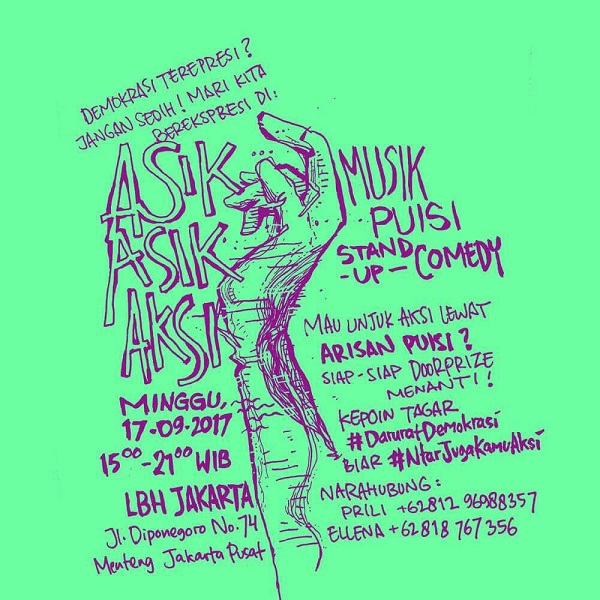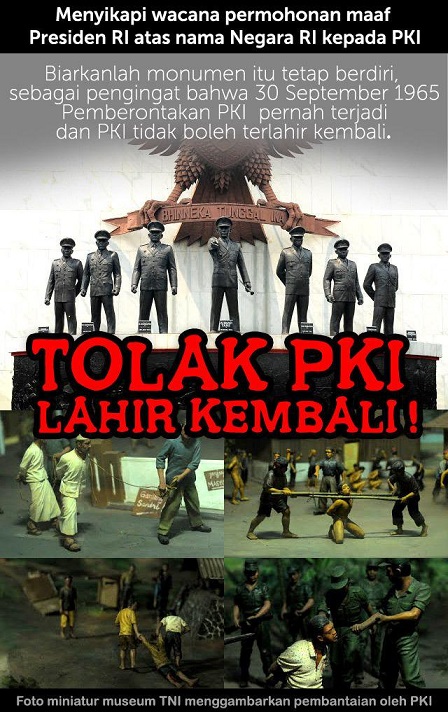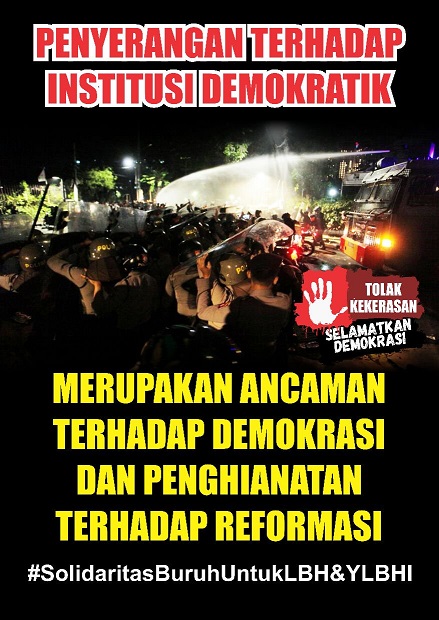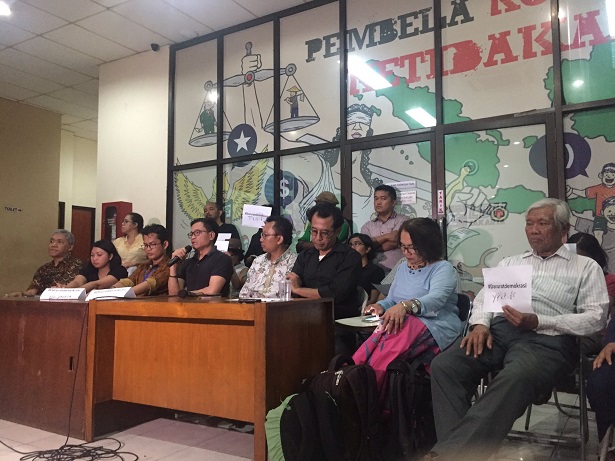Attacks on a meeting of survivors of 1965 and their supporters at the offices of the Legal Aid Institute in Jakarta in September 2017 do not bode well for human rights in Indonesia. SASKIA E WIERINGA provides a first-hand account of the events.
A great deal of confusion and misinformation remains about the period 1965-66; a crucial period in Indonesian history that has left deep scars on the nation. On 16 and 17 September 2017 a group of activists and victims organised a seminar to discuss this history. The main organiser was the Forum 1965, an umbrella association of various organisations of victims of this genocide. Co-organisers were members of the International People’s Tribunal 1965. It had organised a Tribunal in 2015 in The Hague, which had concluded that the Indonesian state should be held responsible for the post-1965 massacres, and that these killings amounted to a genocide.
The venue for the 2017 seminar was the office of the Yayasan Lembaga Bantuan Hukum Indonesia (Indonesian Legal Aid Foundation, YLBHI) in Jakarta. Invited were well known researchers such as Professor Dr Asvi Warman Adam, Dr Baskara Wardaya, Dr Kusnanto Anggoro, Dr Abdul Wahid and others, as well as some of the country’s best known human rights lawyers including Nursyahbani Katjasungkana and Todung Mulya Lubis. It was to be a modest, closed symposium for which, as it was held inside an office and with less than 50 participants, no permit was needed. Such seminars are regularly held in the YLBHI office without any problem. But this seminar turned toxic.
The preparations for the seminar had come to the attention of groups intent on maintaining the New Order version of this tragedy and they made plans to disrupt it. The evening before the seminar, Rahmat Himran, coordinator of the Aliansi Mahasiswa dan Pemuda Anti Komunis (Anti-Communist Students’ and Youth Alliance) met with hardliner retired general Kivlan Zen and representatives of several radical Muslim militia including the PMII (Pergerakan Mahasiswa Islam Indonesia, Indonesian Muslim Students’ Organisation). They decided to break up the seminar. They then contacted the police and asked them to prohibit the meeting. Rahmat Himran is also a leader of the ‘313 militia’, an organisation set up in 2016 to force the governor of Jakarta, the Chinese Christian Basuki Tjahaja Purnama, usually called Ahok, to step down. They organised the first of a series of mass rallies on 31 March 2016, commencing a campaign of mass demonstrations that eventually saw the governor imprisoned on a charge of blasphemy, and losing the following election to his hardliner Muslim rival. Rahmat Himran had also been at the forefront of the virulent anti-LGBT campaign which erupted in late 2015.
— YouthProactive! (@YouthProactive) 17 September 2017
On the morning of 16 September 2017, when the first seminar participants arrived at the YLBHI office they found it closed off by the police. The survivors of the genocide, in their 80s, and many in poor health, had to stand outside in the hot sun while negotiations were going on. Eventually staff were permitted to bring some plastic chairs outside so the old people could sit. Outside the gate members of the PMII, the Laskar Merah Putih (Red White Militia) and GP Ansor (Gerakan Pemuda Ansor, Ansor Youth Movement) had gathered. They were calling for the elimination of the PKI (Partai Komunis Indonesia, Indonesian Communist Party) and for the cancellation of the seminar, which, they asserted, was part of a plan to revive the banned PKI. They were well prepared, carrying banners, and dressed in the uniforms of their respective organisations. They had also come equipped with a van complete with megaphones and loudspeakers. This mob had come directly from a demonstration protesting against the crimes against humanity committed by the Myanmar government against the Rohingya. At that rally, the hardliner politician Amien Rais (of the Partai Amanat National: PAN) not only held forth on the situation in Myanmar, he also called for a jihad against the so-called revival of the PKI and encouraged the revival of the infamous army propaganda film on Gerakan 30 September (30 September Movement, G30S), called the ‘Betrayal of the G30S/PKI’.
The police explained to the seminar organisers that the meeting had to be dissolved as it didn’t have a permit. YLBHI human rights lawyers argued that this was a violation of the right of assembly and of freedom of expression, and that by law no permit was needed for this closed, small seminar. The demonstrators outside shouted ‘Allah is great’, and ‘Eliminate the PKI’. These were the same slogans used during mass demonstrations in 1966, which took place while the genocide was unfolding, both justifying the violence and inciting vigilante groups to participate in the riots, mass arrests and massacres. The old victims patiently sitting outside the building had seen it all before. The slogans, the brutality of a mob set loose. Fifty years earlier they had lost their offices, houses, freedom, loved ones and friends in the midst of that violence.
Saturday 16 September 2017
During negotiations with police, activists alerted the chair of GP Ansor, Gus Yaqut. He immediately called back its members as he had not authorised them to join the demonstrations. This is an interesting development, as members of GP Ansor and its militant unit, Banser, participated in the mass killings in 1965-66. Today, the moderate Muslim mass organisation Nadhlatul Ulema (NU), of which Ansor is the youth wing, is engaged in a struggle against radical Muslim groups that want to control the Muslim population. These groups operate via front organisations such as the PMII. NU is a huge organisation with millions of members and includes some progressive groups such as Gusdurian. The secretary-general of GP Ansor, Abdul Rochman, later issued a statement saying that GP Ansor wants the truth out and thus supports a seminar like this. A related group JIAD (Jaringan Islam Anti-Diskriminasi, Muslim Anti-Discrimination Network) also released a message, stating that to speak the truth about the 1965-66 genocide would liberate society from the shackles of the past. Another statement of support came from the HMI (Himpunan Mahasiswa Islam, Muslim Students’ Association) branch of Gajah Mada University in Yogyakarta. Furthermore, to show their solidarity with the embattled human rights defenders, many organisations, including GP Ansor as well as KOKAM (Komando Kesiapsiagaan Angkatan Muda: Resilience Command of the Muhammadiyah Youth), later helped clean up the debris left by the attack on the YLBHI building.
Finally the participants were allowed in. However in the afternoon police stormed the building, rushing up to the fourth floor, on the pretext that the seminar was going on despite having been prohibited. Their suspicions had been roused when the elderly survivors had returned to the building at around 3pm. They were evacuated to a safe place, but as they had travelled from all over Indonesia they were reluctant to leave. Police continued to swarm the grounds and then decided to attack, though apparently not on their own initiative. Apparently Kivlan Zen and his associates had received information about the discussions inside the building. A clue regarding Zen’s involvement in this issue was aired in the days after the attack on the television programme ‘Indonesia Lawyers’ Club’; he waved his phone around, saying ‘I may be retired, but I get enough intelligence’.
An attack like this on the YLBHI building has never happened, not even during the Suharto times. The building had always been a safe space, where activists could discuss issues freely. But here, the participants were forcibly dispersed by police, who took the banner and documents as proof.
Sunday 17 September 2017
On Saturday evening indignant activists sent out messages denouncing what they called an ‘emergency of democracy’ and called for activists and artists to join them the next day at 10am to celebrate a festival of free speech titled ‘Asik Asik Aksi’. Some two hundred people came, including singers, poets and musicians. The message was, ‘if we cannot speak the truth, we will celebrate it through art’.

Just as the event concluded in the afternoon, demonstrators suddenly entered the grounds and filled the streets around the building of the YLBHI. It turned out that a hoax had been circulating on social media, suggesting that a PKI meeting was going on after all and that participants were singing Genjer Genjer. This was a popular song about a special kind of weed, which the women of Gerwani were said to have sung during sexual orgies and during the castration of army generals on 30 September 1965. These lies were repeated throughout the New Order and became the official version of events, shared constantly in school books and the media. At YLBHI the crowd of approximately one thousand protesters shouted slogans such as ‘long live the army’, ‘disband the PKI’, ‘it is allowed by Islam to drink their blood’, ‘burn them alive’, and ‘Allah is great’. There were also pictures of particular activists held up, with calls made to burn them alive. For security reasons I do not provide their names.
This time, the protesters included members from the large militias of the FBR (Forum Betawi Rempug, Betawi Brotherhood Forum), an ultraconservative Islamist group combining cultural and criminal activities, the FPI (Forum Pembela Islam, Islam Defenders’ Front), and the smaller Majelis Rasulullah. These are all very well organised vigilante groups, well funded, equipped, trained and known for violence. They had been mobilised via their Whatsapp groups and other social media.
They attempted to storm the building. This time police took steps to protect participants. They explained to the protesters that this was not a PKI seminar, just a cultural festival. They also denied that Genjer Genjer had been sung. But to no avail. The protests grew increasingly violent. Stones and bottles were hurled at police and at the building, injuring officers and smashing windows. Inside the building participants barricaded the doors with chairs and desks. The gate was damaged, the grounds were trampled, doors ruined. The police used tear gas and water cannons to sweep the streets clear, but the protesters kept coming. Finally after midnight the first participants of the festival could be evacuated in police buses, by 3am the last convoy of buses had left. They were followed by aggressive youths on motorbikes all the way to the National Human Rights Office, where the participants were safe and from where they could finally go home. Only 22 violent protesters were arrested.
Post-truth? Hoaxes as political manipulation
Historical truth is often contested when people aim to shift power. The conscious manipulation of historical ‘facts’ to produce shifts in power is called black propaganda, usually accompanied by hate speech against the group that has to be dehumanised for the victorious group to justify its violence. The most conspicuous form of such manipulation in Indonesian modern history is the use of the song Genjer Genjer and the portrayal in army propaganda of naked dancing girls castrating the country’s top brass. This image is repeated again and again to justify the genocide in 1965-66 and the continued persecution and stigmatisation of supporters of President Sukarno and the PKI. It is even effective 52 years after it was conjured up. But who are the present day targets? It has become a bit ridiculous to see any danger in the timid, frail, poorly dressed octogenarians who are the survivors of the massacres and prison camps. The new scapegoats are human rights defenders.
hari ini di YLBHI/LBH Jakarta, kami melakukan pentas musik, puisi, dan comedy. Tidak ada diskusi atau seminar apapun. pic.twitter.com/YF9DFyuxLk
— LBH JAKARTA (@LBH_Jakarta) 17 September 2017
Over social media, messages appeared during the attack on the YLBHI office which read ‘YLBHI is the nest of the PKI’. Edited pictures were spread of the participants inside the building below a hammer and sickle and the letters PKI, all dripping with blood. The PKI scare is kept very much alive. But for what purpose?
Hardliner Muslim organisations employ the bogeyman of a communist revival to keep their supporters angry. Before you know it, the message goes, these activists are singing Genjer Genjer and then the Gerwani ‘witches’ may start castrating again. The power of such a simple and melodious song seems exaggerated. Yet the police and the YLBHI staff had to repeat again and again that the song was not sung at the event. What they did sing was Indonesia Raya, and Ananda Badudu sang a song from Banda Neira, in Central Maluku. He bravely kept singing as the windows began to be pelted with stones, to comfort the panicking audience, particularly the genocide survivors.
Though the participants in the seminar were actually doing the work that President Jokowi promised would be done – investigating past human rights violations – the president is yet to condemn the violations of the participants’ constitutional rights, or the violence of the mob. Apparently he does not have the moral courage or political support to stand firm for democracy. He cannot get himself out of the difficult corner in which he finds himself: if he defends free speech he is seen as anti-Islam, and may lose the support of the military, and if he does not protest against the violence he loses any credit he still has with the human rights groups that supported him so strongly in his campaign.
Exposing Jokowi’s inability to stand up for human rights may be one of the tactics of his political adversaries to try to weaken him in the coming elections. And demonstrating their ability to organise street violence may act as a warning – ‘remember what we did to Ahok, who is now in jail?’ Several demonstrators wore jackets carrying the names of the hardliner Muslim candidates who defeated the once popular incumbent. Jokowi made it all worse when on 17 May 2017 he stated that the PKI had to be ‘gebug’ (clobbered) to prevent it raising its head again. These words were eagerly repeated by the Muslim rabble battering on the doors of the YLBHI building.

In general, radical Muslim groups stand to gain from actions like this. By flexing their muscles they hope to gain even more political, social and cultural concessions. They are out for control over the Muslim masses. Only the huge more moderate Muslim organisations such as NU seem to be able to counterbalance their aggression.
The army has its own interests to pursue. First of all they want to maintain support for their version of events for 1965-66. During his Indonesian Lawyers’ Club television appearance, in his shrill aggressive voice, Kivlan Zen repeated all the old lies about the murder of the generals, the presence of Gerwani women, the eye gouging, the weapons the PKI had allegedly stacked away (if they had all these weapons why didn’t they use them when they were attacked and slaughtered?). He called human rights defenders the ‘new PKI’, suggesting the same fate would befall them as befell PKI members in 1965-66. He is supported by various lawmakers who hypocritically call for a ban on discussions on 1965, saying they would only cause friction in society. Thus activists are blamed for provoking the stone-throwing mob.
This renewed repression of human rights defenders cannot be seen as separate from the conclusions of the International People’s Tribunal on crimes against humanity committed in 1965-66. In its final report released in July 2016, the IPT pronounced that the Indonesian state must be held accountable for these crimes, which amount to a genocide. Though the government and the military brushed away this verdict, it renewed discussions on this dark period in Indonesian history and in April 2016 a seminar was held in which both perpetrators and victims told their versions of events. Millions of people for the first time heard the harrowing stories of survivors of the genocide. The results of this seminar were never released. Since then Kivlan Zen and his colleagues held a counter seminar in Balai Kartini, and the social and political climate became increasingly repressive. The notorious human rights violator General Wiranto was appointed as the coordinating minister for security to ensure that there would be no more discussions on past human rights violation
Under-resourced activists such as IPT 1965 and Forum 1965 are clearly no match for the combined forces of the military and hardliner Muslims. They don’t even have the means to communicate safely among themselves. Army intelligence always seems to know well in advance where they are holding meetings, and the agenda. The preparatory meeting for this event in July 2017 was also broken up by the police, as have been numerous other such meetings. On social media the names of the participants of the recent seminar were shared as well as the names of the 26 participating organisations in the subsequent cultural festival, along with calls for violence against them. Discussing the events of 1965-66, and facilitating any such discussions is equated with the revival of the banned PKI. As such all human rights defenders are targeted. Retired General Kivlan Zen also called for the dissolution of all legal aid offices.
Right after the attack on the YLBHI office a call was circulated for a ‘peaceful action’ to be held after Friday prayers at mosques around the parliament. The slogans were ‘oppose the revival of the PKI’ and ‘eliminate the defenders of the PKI’. They were also agitating against a recent presidential instruction which banned the radical Islamist group HTI (Hizbut Tahrir Indonesia) – a group that strives to create a Muslim caliphate in Indonesia. The action was advertised as the ‘299 action’, short for 29 September, the same way the mass demonstrations against Ahok were named. In the end the demonstration was not as large as expected. Some 20,000 police officers were kept in reserve, and ultimately 7000 of them were deployed. The participants, who had been expected to reach the tens of thousands, numbered around 10 to 15 thousand. They rallied against the supposed revival of the PKI, as was the case outside the seminar in the YLBHI building. They also demanded that certain ‘PKI’ members of parliament be dismissed. So clearly political interests were at play.
Ending a cycle of violence
In actual fact only 12.6 per cent of the Indonesian population believes the PKI is being revived, according to a survey in the first half of September 2017 by the Saifulmujani Institute. The majority of that group belongs to the neo-salafist PKS and to Gerindra, the party of Jokowi’s opponent in the 2014 elections. But it is also clear that certain political groups will do all they can to keep the spectre of communism alive. It is a convenient bogeyman behind which to hide their political games.

Indonesia’s cycle of violence will not stop if the hysterical, wilful ignorance of Muslim and other conservative militias continues. The lies around Gerakan 30 September have been exposed; the literature is available for everyone who cares to google it. But these mobs and their leaders do not care for the truth (however incomplete it remains), they are only interested in their own version of events. They move in self-referencing circles, in which they only listen to hardliner clerics and loud-mouthed generals such as Kivlan Zen. In these groups myths, lies, hoaxes and slander circulate, while rational analysis of the events discussed are relegated to the sidelines.his violent episode may mark the start of the 2019 presidential campaign. And it may become even rowdier than the anti-Ahok campaign. That the demonstration on 29 September turned out to be much smaller than expected is solace. It did show however that these demonstrations are carefully orchestrated. In this case buses from all over Java were prevented from going to the site where the demonstration was held. The spectre of communism will be used again and again by those who feel their interests are served by it. Even by the president himself. Joko Widodo seems to believe the version of events presented in the film ‘Betrayal of the G30S/PKI’. On 1 October 2017 he said ‘don’t let the PKI’s cruelty happen again’. Historical discussions in Indonesia may yet become even more toxic.
Saskia E Wieringa (sewieringa@xs4all.nl) is the chair of Gender and Women's Same-sex Relations Crossculturally, University of Amsterdam. She has published widely on sexual politics in Indonesia, women's empowerment and women's same-sex relations globally. Her books include the landmark Sexual Politics in Indonesia (Palgrave Macmillan, 2002). She is chair of the Foundation International People’s Tribunal (IPT) 1965.














